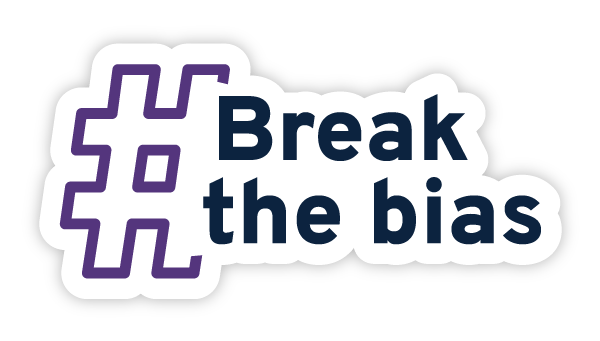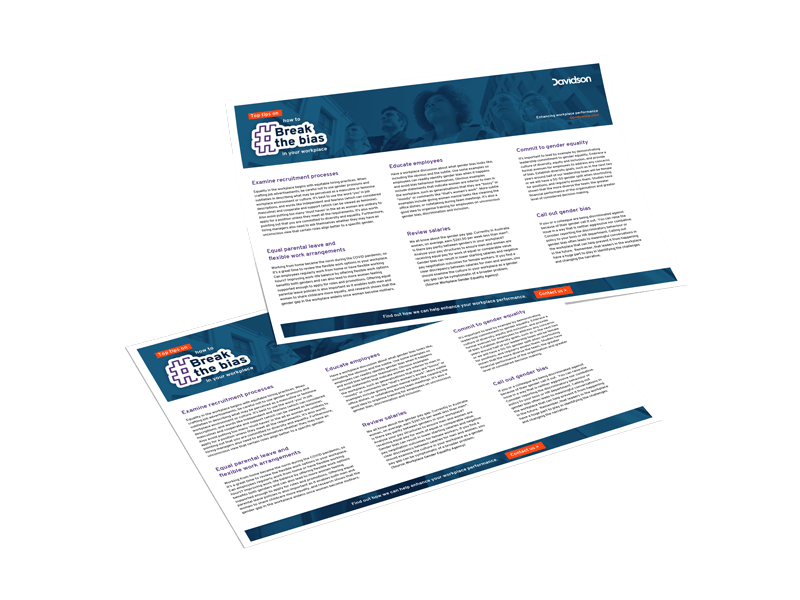Breaking gender bias in recruitment and HR
International Women’s Day - March 8, 2022

When it comes to shining a spotlight on gender diversity and equal opportunities for women in the workforce, recruitment professionals and hiring managers have a lead role to play.
After all, ensuring equality in today’s modern work environment begins with equitable hiring practices.
Yet for a number of reasons, the traditional recruitment process continues to be negatively influenced by what’s called ‘gender bias’.
Gender bias is a preconceived or unconscious view that certain role types align better to a specific gender.
It is a form of discrimination that is problematic in recruitment and human resources as it limits career opportunities for women and can impact an organisation in terms of culture, productivity and profitability.
Davidson Group General Manager Linley Walsh said gender bias unfortunately happens a lot in recruitment and is an issue that is difficult to address.
“It’s largely unconscious and this is why it’s so problematic,” Linley explained. “Direct discrimination is easy to spot and easy to call out, but an unconscious bias is often deeply engrained and therefore harder to change.”
A problem at various levels
Gender bias can occur well before the interview and selection process.
“Job advertisements can be biased towards men, with use of gender pronouns and subtleties in describing what may be perceived as a masculine or feminine workplace environment or culture,” Linley said.
“Gender bias happens often at a board level, and some industries tend to be plagued by it. Sectors like engineering and construction tend to be biased towards men, whereas there can be a bias towards women when hiring for executive assistant and receptionist roles.”
Linley says recruiters have to be careful of not falling into the trap of wanting to “please” their clients.
“A client might reference a specific gender when briefing us on a role by saying ‘he will need to have industry experience’ instead of ‘the successful candidate will need to have industry experience’,” she said.
“We sub-consciously know that the client envisages a man in the role and therefore we may feel the need to deliver on this expectation.”
Another problem, according to Linley, is that women often struggle with imposter syndrome.
“I have experienced this myself throughout my career and I still have to work on a level of self-belief even after 20 years in my chosen field,” she said.
“I see this with our female candidates too. Part of our job description, as recruiters, is not only to identify candidates that possess the skills to do the job but to coach these candidates to believe in themselves.”
Trying to break the bias
Clare McCartin, Group General Manager of Search & Advisory at Davidson, said many sectors and individual organisations have worked hard to “shift the dial” by educating hiring managers' about unconscious bias.
“We measure the numbers of male versus female candidates who apply for executive roles, and we have fewer female candidates at application stage but an equal number at shortlisting stage,” she said.
“This really highlights the fact the females are self-screening out unless they are a very close match to the brief requirements whereas male candidates seem more comfortable to put themselves forward with greater room for growth once they’re in a role.”
Linley said recruiters can help break the bias by being honest with themselves and not being afraid to call it out.
They can also use artificial intelligence during the talent acquisition process, which can be helpful in removing unconscious bias although it has it limits.
“We know that women may not be as comfortable selling themselves and maybe we need to consider acknowledging this and modifying our processes to provide a more level playing field,” Linley said.
It’s time to push the envelope
As we celebrate International Women’s Day, there is plenty the industry can do to push the envelope when it comes to gender bias in recruiting.
Clare believes recruitment firms should publish gender data for their shortlists to help drive meaningful change.
“Great female and male candidates are within reach, so it’s up to us to ensure our teams are delivering balanced shortlists so that Australian organisations have access to diverse fields of talent that represent the entire population,” she said.
“Every study ever done in this area shows the more diverse the team, the greater financial performance of the organisation and greater level of considered decision making.”
Clare said the public sector had led from the front by making impactful change in the numbers of female CEOs, executives and board members leading their organisations.
Having worked in recruitment for more than 20 years, Linley said the industry has come a long way but there is still work to be done.
“Visible role models and shared success stories pave the way for us all,” she said.
“That being said, I would also suggest that male leaders have a huge part to play in identifying the challenges and changing the narrative. Pleasingly this is something I feel we at Davidson do really well.”

International Women’s Day - March 8, 2022
How to break gender bias in your workplace
Share this content





